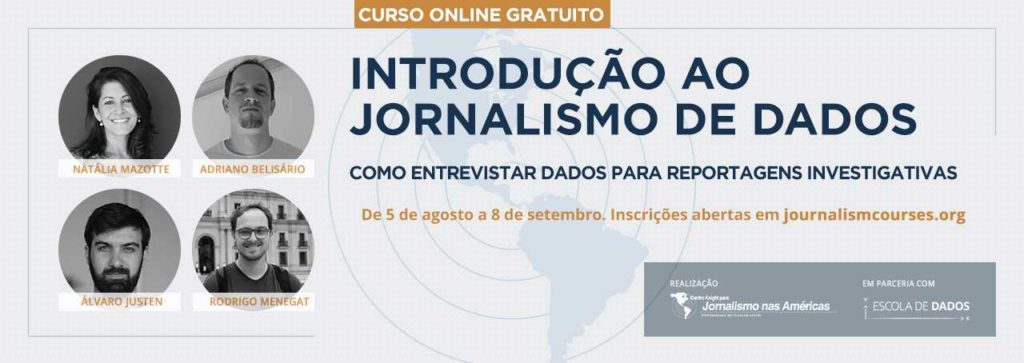
Brazil has become a force for data journalism in Latin America and around the world. The country hosts conferences dedicated to the topic, its media outlets are recognized by international awards and its journalists have created successful sites dedicated solely to the reporting approach.
Despite all this, there’s still progress to be made and databases to be explored.
That’s why the Knight Center for Journalism in the Americas and four instructors from Brazil’s School of Data are joining forces to bring you the online course “Introduction to data journalism: How to interview data for investigative reports.” Register now for the five-week massive open online course (MOOC) in Portuguese that runs from Aug. 5 to Sept. 8, 2019.

“We all know that journalism is in the middle of a crisis and I think most of the people who are finishing journalism school, not only in Brazil, but all over the world, are trying to find their space in this market and how to be a journalist in this new age of internet, of new mediums, new communication channels,” instructor Natalia Mazotte told the Knight Center. “And, I think data journalism is really important in this context because we have much more data available every year and we need to have journalists, professionals, that are able to work with this as a source.”
For the journalist, data journalism can set you apart in the journalism market.
“If you know how to use data to build relevant stories, you will definitely have a spot in this journalism ecosystem because we still lack these kinds of professionals, at least in Brazil and I think in Latin America, in general.”
Mazotte will be joined by three experts in the field: Adriano Belisário, Álvaro Justen and Rodrigo Menegat. They will teach how to develop data-based narratives, taking students through all steps of the data pipeline.
“We have a lot of challenges. We have a lot of stories that are still untold because we don’t have structured data to produce them,” Mazotte said. “So one of the things that we are going to show in this MOOC is how to overcome some of reveal the most common problems we face when we are dealing with data, when we are trying to find the right source for our data journalism stories.”
The instructor also highlighted that students will learn how to be critical of and question data, just as they would be of human sources.
“We need to understand what is behind datasets,” Mazotte explained.
All course instructors have experience teaching and have also worked as professionals in the field.
Natalia Mazotte is executive director of Open Knowledge Brasil, co-founder of data journalism site Gênero e Número and creator of Coda.BR, the first Brazilian conference on data journalism and digital methods. She is a post-graduate lecturer in digital journalism at PUC-RS and in the MBA Web Intelligence and Digital Ambience of COPPE/UFRJ. Mazotte also is currently a John S. Knight Journalism Fellow.
Journalist Adriano Belisário is coordinator of the School of Data and works on evidence production projects with open data and open sources. He has worked with the Ministry of Culture, the State Department of Culture and the Universidade Federal do Rio de Janeiro.
Programmer and professor Álvaro Justen is the founder of open data site Brazil.IO. He is a free software activist and Python programmer. He currently works with data on several Brazilian journalistic and civil innovation projects.
Rodrigo Menegat is a journalist in the area of digital infographics at newspaper Estadão, where he creates reports and visualizations based on information from databases. He has also worked at Folha de S. Paulo and published on sites including The Intercept and Agência Pública.
Instructors will teach the course using video instruction, presentations, readings, discussion forums and quizzes.
Students do not need to have previous experience with data journalism, but advanced materials will be available for those who want to explore the topic in-depth, Mazotte explained.
The course focuses on journalists, researchers and civil society organizations that want to improve how they use, but is open to anyone with that shared interest.
Like all Knight Center MOOCs, the course is asynchronous, meaning students can complete activities during the days and times that are most convenient. However, there are suggested deadline so students do not fall behind.
Students who successfully complete all course requirements have the option of paying an administrative fee of U.S. $30 to receive a certificate of completion in PDF format. No formal college credit is associated with the certificate.
Register today for this free online course and join the data journalism movement happening in Brazil and around the world.
About the Knight Center
The Knight Center for Journalism in the Americas was created in 2002 by Professor Rosental Alves, Knight Chair of Journalism at the Moody College of Communication at the University of Texas, thanks to the generous donations of the John S. and James L. Knight Foundation. The Knight Center’s distance learning program began in 2003 and is funded in part by the Knight Foundation. Over the past six years, the Knight Center MOOCs have reached more than 170,000 people in 200 countries and territories.

Knight Center for Journalism in the Americas
300 West Dean Keeton
Room 3.212
Austin, TX, 78712
Phone: 512-471-1391
Email: journalismcourses@austin.utexas.edu